
Cats are a mercurial sort, we all know this. Unlike their permanently peppy canine counterparts, cats tend to run hot and cold. One minute they’re dozing contentedly on your lap, purring like the engine of a European sports car, and the next they’re digging their claws into your shin just for the hell of it. At their best, cats make for soothing, low-maintenance companions; at their worst, they are downright tyrannical house ninjas.
Unsurprisingly, representations of cats in literature tend to draw from the latter mood. When it comes to fictitious felines, I’m sorry to say that the fiendish comfortably outnumber the friendly.
With that in mind (and because, more than two weeks later, our dreams continue to be haunted by that grotesque Cats film trailer), we bring you, in chronological order of first appearance, the nine most scurrilous (purrilous?) cats in literary history.
*
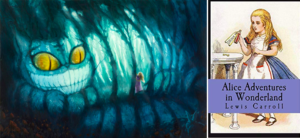
The Cheshire Cat from Alice’s Adventures in Wonderland by Lewis Carroll (1856)
It might be a little ungenerous to call the Cheshire Cat mean. Lewis Carroll’s famously grinning creation is really more mischievous than he is malicious. Still, CC does seem to take a little too much pleasure in confusing and frustrating Alice—a lost youth clearly in need of some intelligible guidance from a local—with his inscrutable non sequiters. His habit of disappearing into thin air so that only his smile remains, hovering spookily in the trees, is also pretty poor social etiquette.
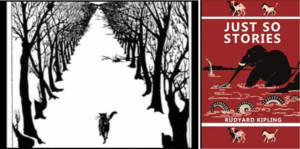
The cat that walked by himself from Just So Stories by Rudyard Kipling (1902)
In case you haven’t cracked open Kipling’s turn-of-the-century collection of animal origin stories for children recently, “The Cat That Walked by Himself” is the tale of an admirably contrarian proto-cat who, upon observing with distain Enemy and Wife of Enemy’s attempts to subdue the local fauna, tricks Wife of Enemy into letting him sit by the cave fire without submitting to a humiliating domestication. Again, it might be harsh to call the cat that walked by himself mean, but he is an outrageously smug little bastard.
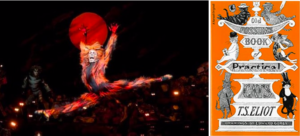
Macavity from T.S. Eliot’s Old Possum’s Book of Practical Cats (1939) / Andrew Lloyd Webber’s Cats (1981)
Macavity the Mystery Cat aka the Hidden Paw aka the Napoleon of Cat Crime aka Idris Elba, is the all-singing, all-dancing master criminal villain of Eliot’s collection of whimsical poems and its insanely popular Andrew Lloyd Weber musical adaptation. Based on Sherlock Holmes’ arch nemesis Professor Moriarty, the ginger tabby’s nefarious deeds include cheating at cards, kidnapping, and exhibiting a general disregard for the laws of Jellicle society. For shame, Macavity.
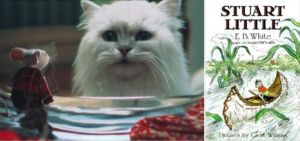
Snowbell from E. B. White’s Stuart Little (1945)
A classic jerk house cat who, were it not for Stuart being under the protection of his human family, would devour the kindly young mouse (not to mention Stuart’s injured songbird friend, Margalo) without a moment’s hesitation. Snowbell (voiced in the film adaptations by the inimitable Nathan Lane) is described (on the Stuart Little Fandom Wiki I’ve been consulting) as “malevolent, self-absorbed, negative, obstinate, witty, bellicose, evil, loathsome, loquacious, testy, ingenious, narcissistic, kooky, eccentric, relentless, boorish, emotional, loud-mouthed and loco.”
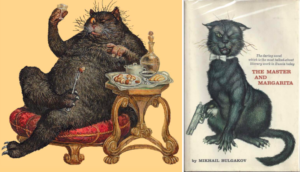
Behemoth from The Master and Margarita by Mikhail Bulgakov (1967)
The granddaddy of all mean literary cats. In terms of iconic feline villainy, no moggie comes close the gun-toting, cigar-chomping, joke-telling miscreant member of Woland’s entourage. Large as a hog and capable of taking human form, this demonic black warecat drinks, smokes, philosophizes ad nauseam, and generally wreaks havoc around Bulgakov’s tinderbox Moscow in what many consider to be one of the greatest novels of the 20th century.
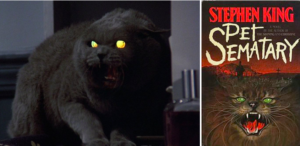
Church from Pet Sematary by Stephen King (1983)
Poor Church (full name Winston Churchill, which may explain things somewhat), he didn’t mean to be mean. In life, Church was a sweet, affectionate, and slightly chonk pet to his young (but doomed) owner, Ellie, and her (also doomed) family. All that changed when Church was flattened by a big ‘ol tanker truck and then interred in the titularly misspelled animal graveyard (which, TWIST, used to be an ancient Indian burial ground). Before you know it a zombified Church has burst from his burial plot and, well, all hell breaks loose with him.
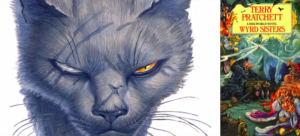
Greebo from the Discworld novels by Terry Pratchett (1988-2006)
Greebo is a big, bolshy, bullying tomcat—feared throughout the magical forests of Lancre—who once chased a bear up a tree and has fathered pretty much the entirety of the cat population of the area. Scarred, flea-bitten, and perennially horny, Greebo was once transformed into a human, or, to be more specific, “a dastardly buccaneer ready to unbuckle any amount of swash; a six-foot, well muscled, grinning bully who radiates a greasy aura of raw sexual energy that can be felt several rooms away.” Goddamn.
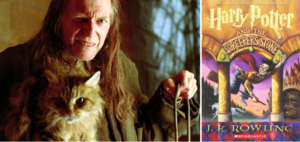
Mrs. Norris from the Harry Potter series (1997-2007)
Mrs. Norris is a narc. Enough said.
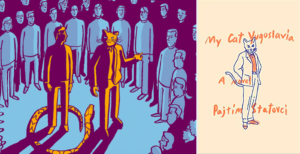
The cat from My Cat Yugoslavia by Pajtim Statovci (2017)
The final feline on our list is comes from the weird and wonderful brain of Finnish-Albanian novelist Pajtim Statovci and is, like Behemoth, of the anthropomorphic talking variety. Yugoslavia the cat is a swaggering, tormented charmer who catches our lonely narrator Bekim’s eye in a Helsinki gay club. Bekim is instantly smitten, and (despite the fact that Yugoslavia reveals himself to be a selfish, cruel, anti-gay, anti-immigrant jackass) invites the cat to move in with him. It does not go well.
If you buy books linked on our site, Lit Hub may earn a commission from Bookshop.org, whose fees support independent bookstores.

